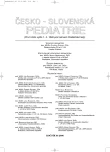Hydrops Fetalis
Fetální hydrops
Fetální hydrops (FH) je charakterizován mohutným nahromaděním tekutiny v extravaskulárním prostoru plodu, včetně různých tělesných dutin. Prognóza FH je vždy závažná a souvisí s vyvolávající příčinou. Rozlišována je varianta fetálního hydropsu imunního a neimunního. S přihlédnutím k tomu, že účast imunitních mechanismů byla prokázána i u formy neimunní, uvádějí některé literární zdroje rozdělení FH na variantu provázenou anémií a variantu bez anémie. Práce formou strukturovaného přehledu přibližuje etiologii, diagnostiku a léčbu FH.
Klíčová slova:
fetální hydrops, etiologie, rozdělení, léčba, prognóza
Authors:
Z. Doležel; D. Wechsler; M. Janková; L. Elstnerová
Authors‘ workplace:
II. dětská klinika LF MU a FN, Brno
přednosta prof. MUDr. Z. Doležel, CSc.
Published in:
Čes-slov Pediat 2006; 61 (1): 20-25.
Category:
Postgraduate Education
Overview
Hydrops fetalis (HF) is a clinical condition in which excessive fluid accumulation in the extravascular compartment of the fetus leads to widespread soft tissue edema/collection of fluid in the fetal body cavities. The prognosis of HF is highly dependent on the underlying pathology and early diagnosis is essential to identify treatable cases. The current classification of immune and nonimunne HF is not sufficient. A more practical approach to describe the etiology of HF is based on the presence or absence of anemia. The distinction between anemic and non-anemic HF allows for a more structured approach towards diagnosis and therapy.
Key words:
hydrops fetalis, etiology, classification, therapy, prognosis
Labels
Neonatology Paediatrics General practitioner for children and adolescentsArticle was published in
Czech-Slovak Pediatrics

2006 Issue 1
- What Effect Can Be Expected from Limosilactobacillus reuteri in Mucositis and Peri-Implantitis?
- The Importance of Limosilactobacillus reuteri in Administration to Diabetics with Gingivitis
Most read in this issue
- Hydrops Fetalis
- Byler Syndrome – A Case Report
- Successful Treatment of a Child with Acute Respiratory Distress Syndrome (ARDS)
- The Problem of Pertussis at the Child Age
